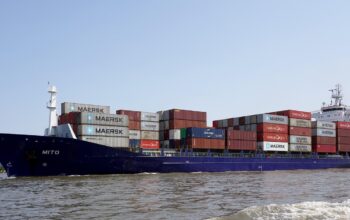Supply chains are the backbone of manufacturing, and they’re evolving fast. Let’s delve into the real-world stories that are reshaping the industry:
1. Automation: The Game-Changer
U.S. manufacturers are turning to automation at an unprecedented rate. With labor shortages looming large—over 2 million jobs expected to go unfilled by 2030—companies are investing heavily in automated processes to boost efficiency and stay competitive. Automation isn’t just about cutting costs; it’s also about building resilience and cutting-edge technology.
2. Supply Chain Disruptions: A Call for Agility
Global supply chains have faced unrelenting challenges from component shortages to transportation delays. In response, manufacturers are diversifying supplier networks, adopting nearshoring strategies, and leveraging advanced technologies like AI and blockchain to enhance supply chain visibility and predictability.
3. Technological Advancements: The Future of Production
The manufacturing sector is in the midst of a technological revolution. Traditional industrial robots are being complemented by collaborative robots that work alongside humans, offering greater flexibility. Technologies like 3D printing and digital twins are also transforming production methods, enabling rapid prototyping and real-time optimization.
4. COVID-19 Lessons: Building Resilience
The COVID-19 pandemic taught manufacturers valuable lessons about supply chain resilience. Companies shifted from just-in-time models to emphasizing inventory management and nearshore sourcing. This strategic shift has helped mitigate future disruptions and improve supply chain visibility.
5. Hydraulic Fittings Manufacturers Navigating Disruptions
Hydraulic fittings and adapters manufacturers are navigating global supply chain challenges with strategic sourcing, robust inventory management, and optimized logistics. By prioritizing long-term supplier relationships and domestic production, companies like Air-Way Manufacturing are ensuring delivery reliability despite material shortages and transportation bottlenecks.
Key Trends to Watch:
- Automation and AI Adoption
- Supply Chain Diversification
- Technological Advancements in Manufacturing
- Resilience and Nearshoring Strategies
- **Market Response to Global Disruptions
References:
- https://industrialautomationco.com/blogs/news/why-u-s-manufacturers-are-turning-to-automation-in-2025-solving-labor-cost-and-supply-chain-challenges
- https://newsexaminer.net/how-supply-chain-disruptions-are-shaping-the-future-of-manufacturing/
- https://cloud.google.com/transform/101-real-world-generative-ai-use-cases-from-industry-leaders
- https://www.youtube.com/watch?v=zQES9pq-WdM
- https://www.air-way.com/news/how-hydraulic-fittings-manufacturers-are-navigating-global-supply-chain-disrupti
- https://www.scusd.edu/sites/main/files/file-attachments/april_10_2025_amended_packet.pdf?1744070420
- https://www.numberanalytics.com/blog/key-manufacturing-industry-trends-reshaping-global-markets
- https://www.manufacturingdive.com/news/covid-19-pandemic-impact-labor-supply-chain-five-year-anniversary/744604/



